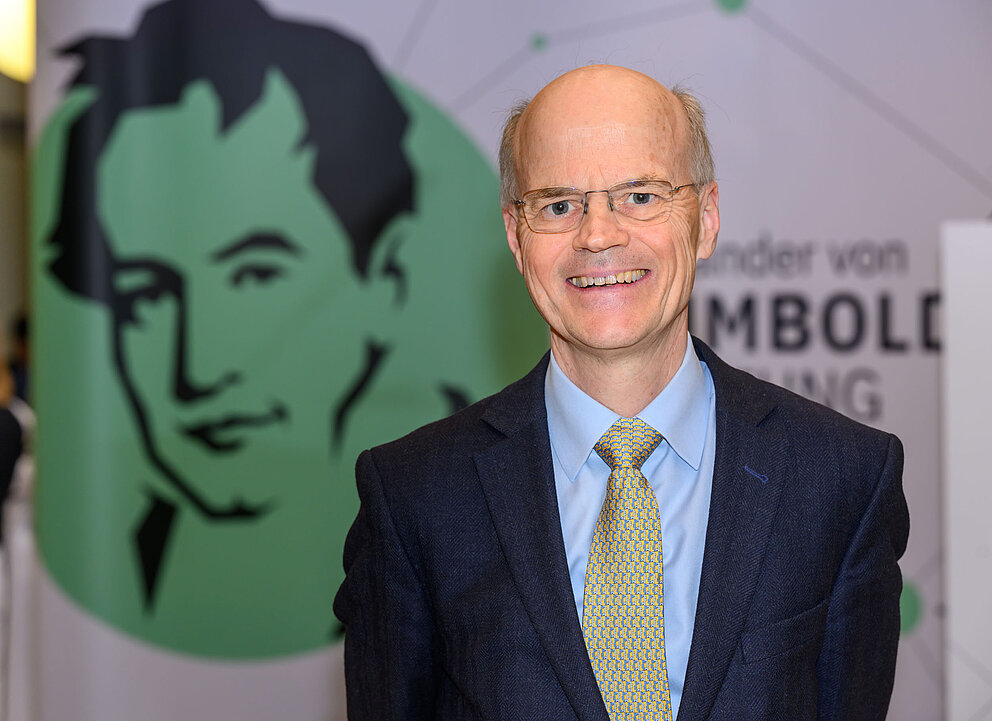

Contact
Press, Communications and Marketing
Tel.: +49 228 833-144
Fax: +49 228 833-441
presse[at]avh.de
On 1 April 2024, the long-standing Secretary General of the Alexander von Humboldt Foundation, Dr Enno Aufderheide, will be entering retirement. He assumed the position in July 2010.
The President of the Humboldt Foundation, Robert Schlögl, thanked him at a farewell event with the staff in Bonn. “Enno Aufderheide has represented the Humboldt Foundation in an exemplary fashion worldwide. In his nearly 14 years in office, he has breathed life into the concept of a Humboldt Network. In addition to administrative and political activities he has inspired sponsorship-recipients of all generations for the networking idea, established and fostered contacts. We should like to thank Enno Aufderheide for manoeuvring the Foundation safely through turbulent times, for his tireless engagement in internationalising German science and academia and, last but not least, for his unfailingly approachable and reliable manner. He will be difficult to replace.”
“My experience with the network tells me that anyone who has been part of the world-spanning community within the Humboldt Network will never be tempted to follow the social trend towards polarisation and inciting hate. That’s why Humboldtians repeatedly act as bridge-builders, both in their own countries and between countries.”
Enno Aufderheide can look back on a fulfilling term in office. “When I started at the Humboldt Foundation, I knew that it was a flagship attracting extremely good researchers to Germany. Without the Humboldt Foundation and its recruitment of specialists, research in Germany would not be so competitive.” Over the years, many examples had proved the point, such as the Nobel Prize for Emmanuelle Charpentier, who had previously come to Germany as a Humboldt Professor, or Stuart Parkin’s move from the United States to Halle, also on the strength of Humboldt sponsorship.
“But there is one dimension of our work that really makes the Humboldt Foundation unique,” said Aufderheide, referring to current social debates in Germany. “My experience with the network tells me that anyone who has been part of the world-spanning community within the Humboldt Network will never be tempted to follow the social trend towards polarisation and inciting hate. That’s why Humboldtians repeatedly act as bridge-builders, both in their own countries and between countries,” he stated.
During Aufderheide’s period in office, the Humboldt Foundation was confronted with many global crises and events, and responded with flexible programmes and offers of help. Following the Russian invasion of Ukraine, for example, the Humboldt Foundation took on the implementation of the EU’s MSCA4Ukraine Programme for refugee researchers together with European partners. By initiating a comprehensive digitisation drive in selection and sponsorship, the Foundation was able to cushion the impact of the Covid pandemic on international academic exchange. Aufderheide campaigned for the creation of the Philipp Schwartz Initiative for researchers at risk. Since 2015, the programme has been helping researchers who are persecuted in their own countries to continue their work at German universities and research institutions.
In recent years under Secretary General Enno Aufderheide, the Humboldt Foundation has focused on all aspects of diversity in order to continue developing its network and tapping new potential. This includes actively recruiting outstanding Humboldt Research Fellows through the Henriette Herz Scouting Programme and regular evaluations of the issue. Moreover, since 2012, collaborations with researchers from emerging economies and developing countries have been reinforced by the Georg Forster Research Award. And since 2021, Humboldt Research Hubs in Africa have been developing strategies to deal with pandemics in the context of an African-German partnership.
During Aufderheide’s term in office, the Humboldt Foundation’s budget increased from 97 million euros (2011) to 163 million euros (2023). However, basic financing for the Foundation still poses a challenge. The annual budget increase of three percent envisaged for the Foundation in the federal government's Coalition Agreement, in line with the Pact for Research and Innovation, has not yet been implemented.
Before joining the Humboldt Foundation, from 2006 to 2010, Enno Aufderheide, who was born in Bochum in 1958 and holds a doctorate in biology, was head of the Research Policy and External Relations Department at the Max Planck Society in Munich. Prior to that, he was the executive director of the Science Section at the Helmholtz Association, head of the Research Department at the German Council of Science and Humanities and held various positions as well as being involved in projects at the German Aerospace Center.
Until the position is filled, the current Deputy Secretary General Dr Thomas Hesse will manage the Foundation on a temporary basis.
(Press release 5/2024)
Every year, the Alexander von Humboldt Foundation enables more than 2,000 researchers from all over the world to spend time conducting research in Germany. The Foundation maintains an interdisciplinary network of well over 30,000 Humboldtians in more than 140 countries around the world – including 61 Nobel Prize winners.

